GCFI is pleased to announce that the 77th annual meeting of the Gulf and Caribbean Fisheries Institute (GCFI 77) will be held in Guadeloupe, French West Indies from 4 – 8 November 2024.
Enlaces rapidos
GCFI77 – Guadalupe, French West Indies
Acerca de la Conferencia
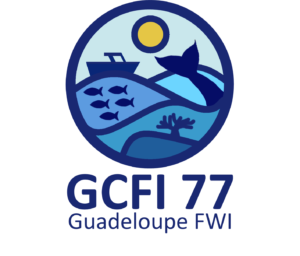
El GCFI se complace en anunciar que la 77ªva conferencia anual del Instituto de Pesquerías del Golfo y el Caribe (GCFI por sus siglas en inglés),) se llevará a cabo en Guadeloupe, French West Indies, del 4 al 8 de noviembre de 2024. El GCFI se ha asociado con el Consejo Regional de Guadalupe (The Regional Council of Guadeloupe) para auspiciar el GCFI 77.
Tema De La Conferencia
El tema de la conferencia de este año es “Ecosistemas marinos bajo presión: reducción, refuerzo y reconciliación para mejorar la calidad de vida de las poblaciones humanas”. Únase a nosotros en Guadalupe, Antillas francesas el próximo mes de noviembre para intercambiar ideas y perspectivas sobre la investigación y la ciencia emergentes con relevancia directa para la gestión y la gobernanza. Mientras miramos hacia un futuro de pesca sostenible, es necesario examinar opciones, vías y barreras. Teniendo esto en cuenta, estamos preparando un programa compuesto por una sesión plenaria de apertura, sesiones generales, talleres y sesiones técnicas relacionadas con la sostenibilidad, los peces y los ecosistemas acuáticos, los desechos marinos, la gobernanza, las áreas marinas protegidas, el sargazo, las especies invasoras, la pesca y la sociedad, y las innovaciones en la ciencia marina. Reuniremos a expertos, académicos, responsables políticos, gestores, pescadores y organizaciones pertinentes interesados en cuestiones marinas, recursos naturales, pesca sostenible y turismo.
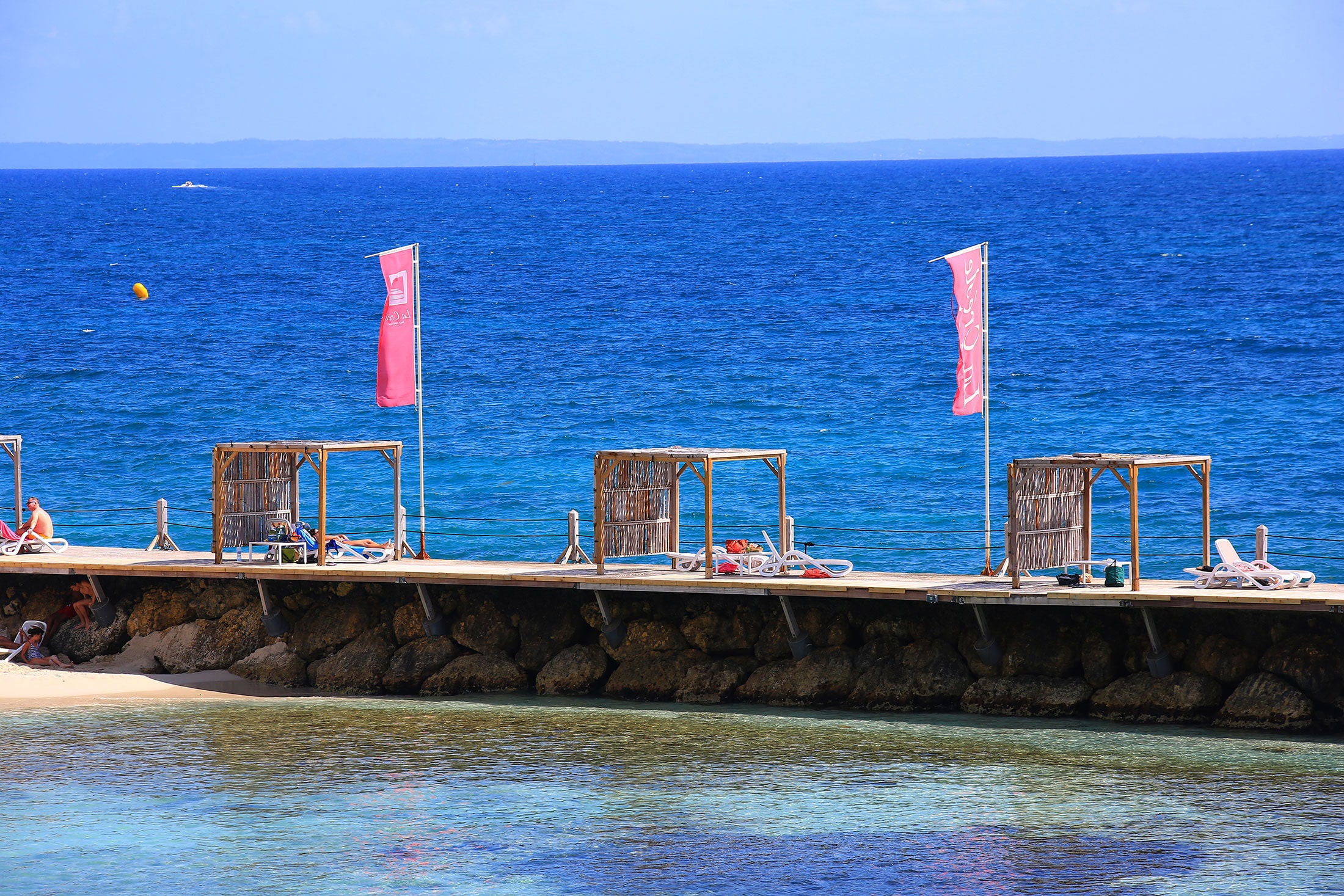
KEYNOTE SPEAKER: DR. DALILA ALDANA ARANDA
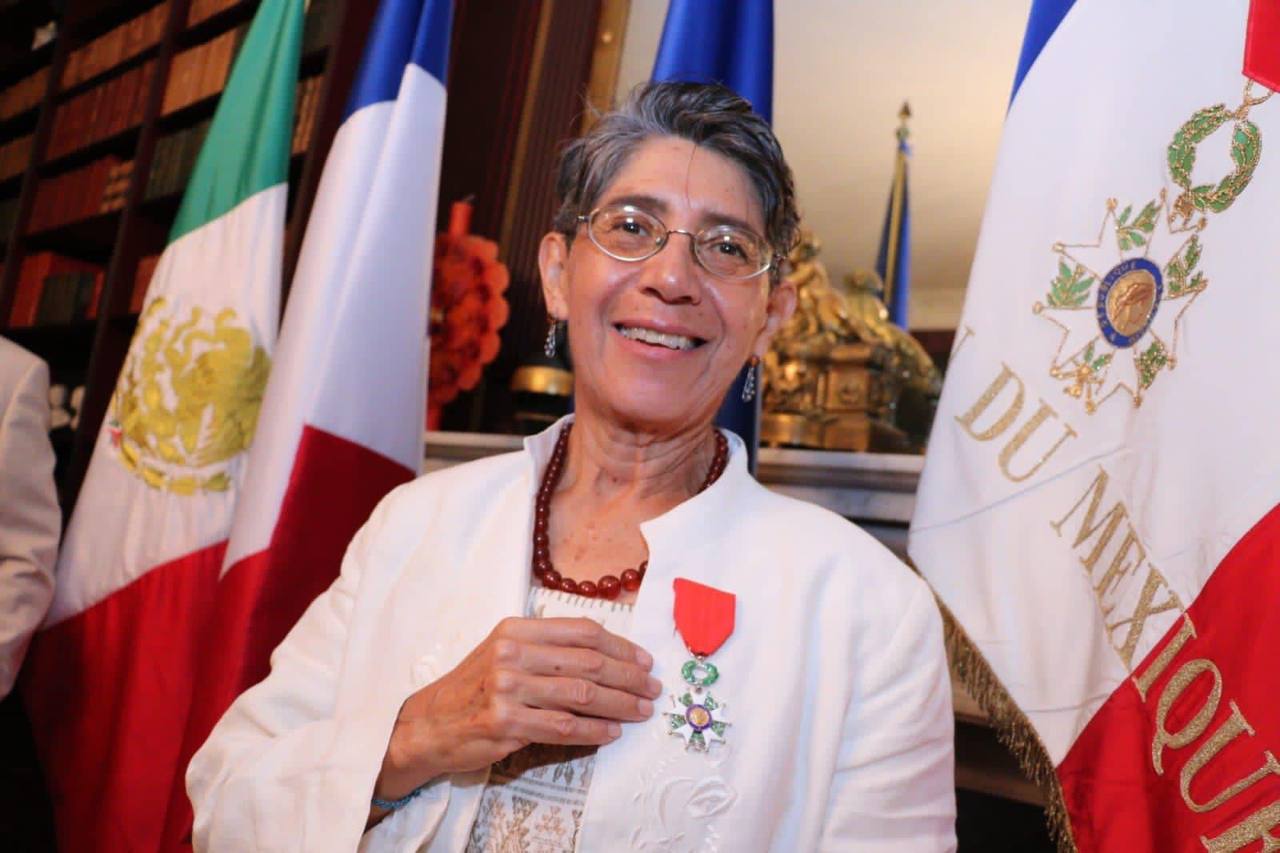
Dalila Aldana Aranda is a Biologist from the National Polytechnic Institute. Her distinctions include being the recipient of the National Award for Ecological Merit, Knight of the Legion of Honor of the Republic of France, Knight of the Academic Palms from the French Ministry of Education and the Science Communication Award from the Spanish Agency for Scientists.
Her managerial positions include being the First Woman to be the Chair of the Gulf and Caribbean Fisheries Institute and Ibero-American Coordinator of the Science and Technology for Development Program (CYTED). She is the President of the Caribbean Marine Laboratory Association and President of the Mexican Academy of Sciences.
All her professional activity has been carried out in the Caribbean, as a researcher at CINVESTAV IPN. Her research is focused on aquaculture and fisheries management as well as the effect of climate change and ocean acidification and microplastic pollution. She holds a Doctorate in Biological Oceanography, Aquaculture and Fisheries from the University of Bretagne Occidentale, France. She has a second PhD in Population Biology from the University of Marseille, France and also has the qualification to direct doctoral thesis in France (HRD).
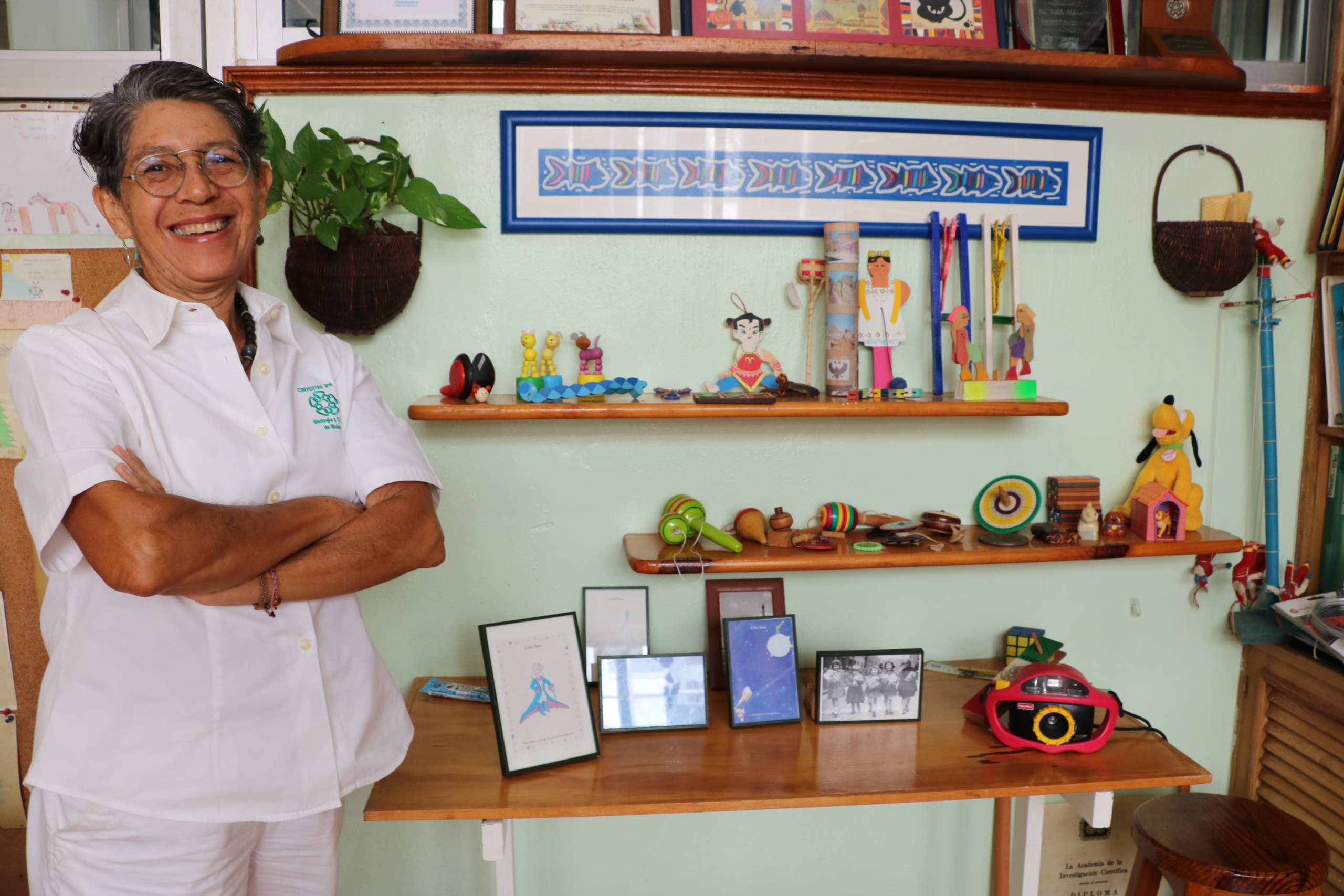
Several of her investigations have been pillars in management plans for fisheries and the social and economic importance in the Gulf of Mexico and the Caribbean. She has 80 indexed articles, book chapters and directed more than 50 graduate theses. She has an outstanding number of citations in her research discipline. She has developed extensive cooperation actions with France (French Antilles, University of Brest, University of Maine) and in the Caribbean and Latin America. Several of these activities have been carried out with the GCFI, CFMC and the Caribbean Member States. She has been a researcher invited as a scientific expert by the FAO, OAS and Caribbean Fisheries Management Council.
She has been actively involved in various science popularization and dissemination programs of the Mexican Academy of Sciences, with several programs including the AMC’s Passport to the Path of Scientific Knowledge. She has also been actively involved with the UN 11F Program, on the International Day of Girls and Women in Science.
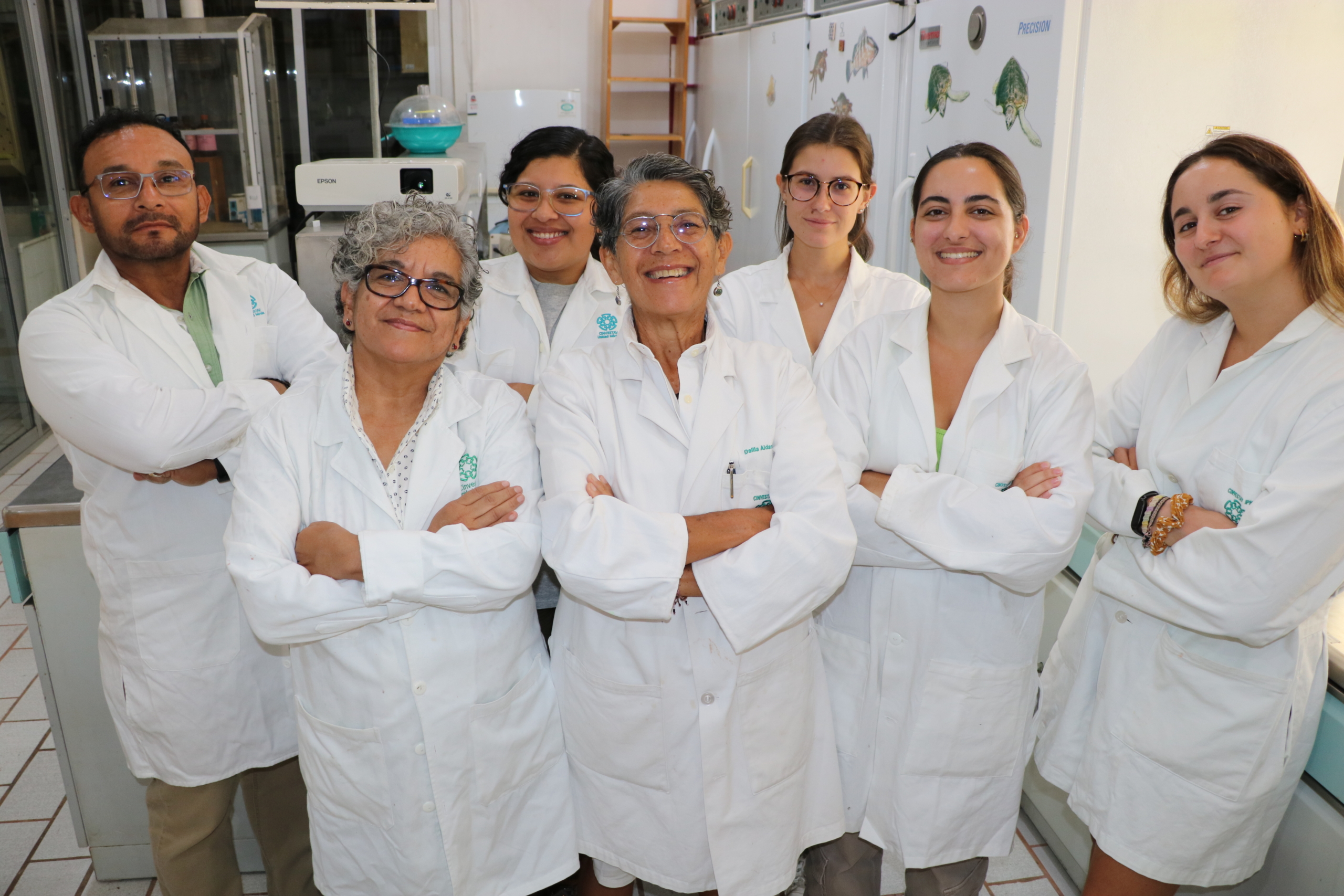
She has been a keynote speaker at several international congresses, at the World Aquaculture Congress on several occasions, at the Caribbean Academy of Sciences (CAS), the World and Latin American Mollusk Association, Aquaculture Nutrition, Applied Malacology and now at the Gulf and Caribbean Fisheries Institute. She has mounted 5 exhibitions in museums nationwide, and 2 exhibitions in museums in France. She is the author of a popular collection of 10 books on Caribbean Environmental Conservation and writes with great dynamism on environmental issues
Lugar De La Conferencia
La Creole Beach Hotel & Spa, en Gosier, será la sede principal del GCFI77. Consulte la página de inscripción a la conferencia GCFI para obtener información sobre el lugar, el transporte, el viaje y el alojamiento. A medida que se acerque la reunión, se publicará en el sitio web más información sobre el lugar y el programa.
Hotel Address: BP 61 Pointe de la Verdure, 97190, Gosier, Guadeloupe
Reservation link to be posted soon!
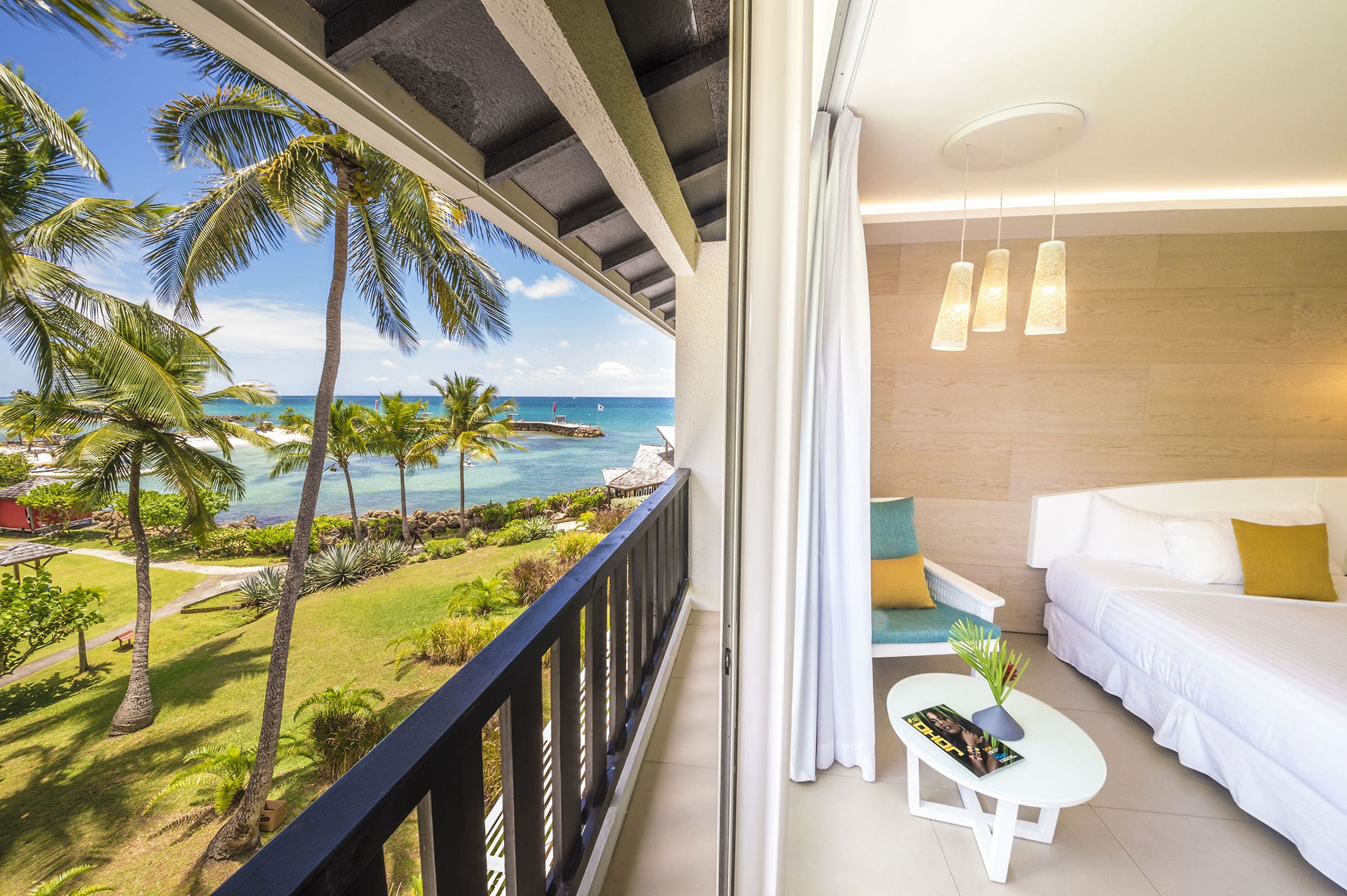
Travel Information
-
from Saint Martin french side (Grand Case airport) with Air Caraibes www.aircaraibes.com (Daily flights)
-
from Miami with Air France and American Airlines (MIA – PTP on Friday & Sunday | PTP – MIA on Thursday & Saturday)
-
from the Dominican Republic with Skyhigh (https://skyhighdominicana.com
) and Air Caraïbes (Multiple flights during the week from SDG) -
from St Barth with St Barth executive https://www.stbarthexecutive.
com/ (they also have a San Juan -> St Barth flight)
Convocatoria De Resúmenes
Los resúmenes de los trabajos para el GCFI 77 serán recibidos hasta el 5 de julio del 2024. Los resúmenes serán aceptados en inglés, español y francés. Todos los resúmenes deben venir acompañados con sus respectivos títulos en Ingles, Español y Frances, los resúmenes solamente son requeridos en uno de los tres idiomas. Sin embargo, el titulo debe estar en los tres idiomas. El número máximo de palabras aceptado en el resumen será 275 en español y francés. Los resúmenes deben ser enviados a través del portal del GCFI Resumen Formulario de Registro.
La aceptación para presentar en una sesión oral requiere que se entregue un manuscrito o un resumen extendido de la presentación en el formato apropiado (MS Word y figuras en formato jpg o PowerPoint). Aquellos estudiantes que desean competir para las becas deberán entregar su manuscrito al inicio de la reunión anual. Las instrucciones para la preparación de manuscritos están disponibles en la siguiente página: en línea. El libro de resúmenes estará disponible en línea en formatos PDF y de volteo de páginas. No habrá formato impreso del libro de resúmenes durante la conferencia. No se distribuirá ningún libro impreso de resúmenes en la conferencia. Los autores de presentaciones aceptadas serán notificados por correo electrónico en julio de 2024. Debido a limitaciones de tiempo no todas las solicitudes para presentaciones orales serán aceptadas. Solicitudes para presentaciones orales no aceptadas serán consideradas automáticamente para las presentaciones de carteles.
Special Sessions
Marine megafauna guiding the way to improved ocean management
Rationale: Marine megafauna have no political boundaries. Their range often spans national and international jurisdiction. Growing threats are putting populations at urgent risk. The survival and safety of megafauna requires unprecedented levels of cross-boundary and cross-sectoral cooperation between science, local communities, industry, governments and international sectoral bodies. Migration corridors and movement help inform management of human activity to get towards improved protection of marine megafauna throughout their life cycle.
Goal: The goal of this session is to provide an overview of research and conservation efforts carried out in the Caribbean Sea and Gulf of Mexico regarding marine megafauna, to provide feedback on successful/unsuccessful tools, solutions and methods in order to identify gaps and solutions in conservation efforts discussions and exchanges between presenters and the audience.
Description: First, we aim to outline the latest knowledge of marine megafauna critical habitat based on distribution, migration corridors and movement and interference with human activity to better manage local and international threats, including the results of the first phase of the Interreg regional CAMAC project (Caribbean Marine Megafauna and Anthropogenic Activities) and the objectives of phase 2 and Protecting Blue Corridors. Secondly, we will explore what knowledge, policies and other opportunities and solutions are already out there, e.g. mitigation measures, Marine Protected Areas, etc. Thirdly, together we identify the needs and next steps to enable effective protection of marine megafauna, such as enhanced collaboration and harmonisation of ocean governance and how do we get from knowledge to action. The sessions will be adapted according to the abstracts submitted to the session by the technical partners listed below.
Interests: Marine mammals, turtles, seabirds, sharks and rays are iconic species of our oceans playing vital roles in the long-term health of our marine ecosystems upon which we rely for food, income, protection against climatic events and climate change effect mitigation. While efforts to address these questions are increasing, a lot of work remains to be done to improve our knowledge and protection on these species in relation to their interactions with human activities in the region. This special session intends to shed light on recent scientific and technical advances in the Caribbean and Gulf of Mexico. By inviting regional experts and encouraging lively discussions, we hope to pave the way to wider and stronger collaborations in the region, setting the scene for improved protection and conservation of these iconic species. In particular, harmonizing research and conservation efforts can lead to more effective conservation strategies that would facilitate the coordination of ocean governance across the region.
Target Audience: This session is mostly directed towards scientists, policy advisors, environmental managers, NGOs and other stakeholders involved in marine megafauna projects (fishermen, port authorities, tourism and shipping industry, etc.). Given the ecological role of marine megafauna species and their wide distribution in the region, interest for this session will go far beyond the megafauna experts alone. It will also be a great opportunity for students to share and learn about inspiring studies and meet key stakeholders for a potential career in marine megafauna research and conservation.
This session will benefit both the presenting speakers and organisations for showcasing their work to the community and the stakeholders listed above for obtaining high-level information on this crucial matter from a variety of locations in the region. This session, in line with the GCFI conference, will represent a platform of exchanges and discussions, creating or strengthening bonds between participants, fuelling the growing momentum for regional science and conservation efforts for marine megafauna.
Source of funding: WWF (Dutch Caribbean team & Protecting Whales & Dolphins Initiative) and the Agoa Sanctuary – French biodiversity agency (OFB) intend to fund the special session on their own budget.
Contact: Monique van de Water (WWF-NL Dutch Caribbean)
Sargassum Solutions
Rationale: Sargassum fluitans and natans are the brown free-floating seaweeds that have inundated Caribbean, Central American and West African nations. These massive influxes of Sargassum have considerable impact on these nations’ economies and local livelihoods as it hinders artisanal fisheries, causes health issues from the gasses produced during wet decomposition and resulting beach closures affect tourism.
Island nations have limited land space and so dumping the Sargassum in landfills is not a long-term sustainable solution to removing Sargassum from the beaches. Some solutions proposed outside of dumping the seaweed into landfills include:
- turning it into useful products such as blocks for building or bioplastic,
- using the biomass as fertilizer
- returning the biomass to the ocean as a means of carbon sequestrationIn this session we hope to further discuss the feasibility and scalability of these solutions and identify the challenges associated with implementing them.
Agenda:
1) Welcome and Sargassum monitoring
- Outline of the Sargassum problem and the need to divert Sargassum from rotting on beaches and landfills to products and services. (Franziska Elmer, Seafields, 10 min)
- Sargassum monitoring: Satellite and drift modelling (Marion Sutton, 30 min)
2) 2nd hour How to collect fresh Sargassum
- Sargassum collection: barriers (Joel Gonzales, ASOCEAN, Rolando Chavez Peñaherrera, DESMI)
- Sargassum collection: harvest boats (Andres Bisono, SOS carbon)
- Sargassum storage/growth: aquafarms (Franziska Elmer, Seafields)
3) Sargassum products mini expo
- 5 min talks from Sargassum product companies
- Tables with products and free walk around to engage with the companies: products samples to take home
4) Sargassum sinking stakeholder consultation
- Sinking of Sargassum for carbon sequestration (5-10 min, Franziska Elmer, Seafields)
- Deep sea research: methods, instruments (15- 20 min, Tremaine Bowman, Seafields)
- Stakeholder consultation on sinking Sargassum (20-30 min):
- Do attendees have a formed opinion on sinking Sargassum?
- What are their concerns?
- Where are the knowledge gaps?
Importance and target audience: These inundations show no signs of decreasing in the near future and the season for Sargassum influxes seems to be widening. The negative impact that the inundations have put on fishers, coastal residents and the tourism industry has been significant. As such, fishers, researchers, government representatives and policymakers throughout Latin America and the Caribbean will benefit from these solutions so that removal of Sargassum from the beaches can be useful and sustainable in the longer term.
Contact: Tremaine Bowman and Franziska Elmer (Seafields Solutions)
Special Session: Council Regional of Guadeloupe Blue Growth Policy ( 2 hours)
1. Introduction
- Promotional Video (5 minutes): A film showcasing the richness of Guadeloupe’s marine biodiversity and the key challenges of blue growth, including aerial footage and interviews with scientists and locals.
- Opening Speech (10 minutes): Address by the president of the blue economy commission.
2. Overview of Regional Policy: Detailing the guidelines, ongoing projects, and successes of the blue growth policy with visual data by the blue growth directorate.
3. Case Studies and Testimonials by various speakers on environmental protection and sustainable development projects. Includes a short film with testimonials from beneficiaries.
4. Expert Panel and Moderated Discussion: With marine biology experts, elected officials, and commission presidents, each panelist discussing an aspect of the regional policy, followed by a Q&A session with the audience.
5. Summary and Future Directions : presenting conclusions, the next steps and upcoming projects for the regional policy.
6. Closing Address: By the president of the blue economy commission to thank participants and encourage ongoing collaboration.
Innovative technology for fisheries assessment, management and conservation
Date: Sunday November 3, 2024 Half Day Workshop (5 Hours)
Description: Fisheries sampling methods that are non-extractive and non-destructive, capture a large portion of the population, and are cost effective and accurate are crucial to modernizing fisheries assessment. Current assessments rely heavily on direct human observation, typically catch and release measurements, dockside interviews, and/or visual census of fish populations. Thus, current sampling methods require significant investments and science/management capacity that often do not exist, especially in the thousands of small-scale, data-limited fisheries operating around the world. However, rapid advancement in imaging technologies hold promise for new sampling methodologies that democratize data collection. This workshop will discuss new and evolving imaging technologies, including depth-sensing cameras, and emerging citizen-science data collection programs associated with these tools.
A case study will include the presentation of the technology, methodology and results to date from the SMILE project (Size Matters: Innovative Length Estimates). Citizen science scuba divers use low-cost, waterproof cameras equipped with a laser that allows for the measurement of fish captured in pictures using AI technology. The SMILE project is a collaboration between South Atlantic Fishery Management Council’s (SAFMC) Citizen Science Program, Reef Environmental Education Foundation (REEF), Southeast Coastal Ocean Observing Regional Association (SECOORA), Axiom Data Science, Scripps Institution of Oceanography Semmens Lab, University of California San Diego (UCSD) Engineers for Exploration, (E4E), UCSD Kastner Research Lab and The Nature Conservancy California.
Scientists and fisheries managers employing or researching innovative technology for data collection and fisheries assessment will be invited to present and are encouraged to participate in the workshop. Scientists working on data-limited assessments and people likely to participate in citizen scientist programs will also be encouraged to attend. The goal of the workshop is to learn from successes and challenges in this quickly evolving field. In addition, we aim to gain understanding on how these technological advances and their incorporation into citizen science programs can improve data used for management. The workshop will provide an open discussion with the aim to expedite improvements to the technology and methodology of current programs (e.g., SMILE project). We will aim to foster future collaboration between scientists and institutes to facilitate widespread data-sharing and continued growth in the field of fisheries assessment.
Contact: Alli Candelmo, Reef Environmental Education Foundation (REEF)
Sesiones Técnicas
El programa de conferencias ofrece sesiones temáticas multidisciplinarias. Cada sesión puede tener una mezcla de Ciencias naturales y sociales, gestión y tecnología relacionada con el ecosistema o la pesca, destacando el tema de la Conferencia. Se solicitan presentaciones orales y de carteles en las siguientes áreas (también se considerarán otros temas no enumerados a continuación):
- Gobierno, medios de subsistencia y organizaciones
- Arrecifes de coral y pesquerías de ecosistemas asociados
- Peces arrecifales someros y profundos
- Pesquerías de pargos y meros
- Agrupaciones de desove de peces
- Pez león y otras especies invasoras
- Ciencia y manejo de Áreas Marinas Protegidas
- Biología, ecología y evaluación de las pesquerías de invertebrados, incluyendo el caracol, langosta y pulpo
- Pesquerías pelágicas y recreativas
- Pesquerías en los ecosistemas de la plataforma continental
- Pesquería de arrastre en peces y camarón
- Hábitats, el cambio climático y manejo costero
- Biodiversidad
- Hábitat esencial para peces
- Manejo integrado de la zona costera
- Adaptación al cambio climático
- Acuicultura
- Basura y desechos en el mar
- Ciencias innovadoras
- Comunicación y Educación ambiental
GCFI Premios Para Estudiantes
Premios Estudiantiles Por Logros Académicos
GCFI otorga becas de $1,500 a las mejores presentaciones orales y pósteres. El contenido de la presentación debe estar relacionado con la investigación final realizada por el estudiante en relación con su tesis o disertación. Si ya se presentó, esta tesis o disertación no debe tener más de un año Los ganadores del premio recibirán su beca en la conferencia del año siguiente, para ayudar a respaldar su participación en esta reunión. Las instrucciones completas y los requisitos de elegibilidad se encuentran en la página web de Premios al Logro Estudiantil Sobresaliente.
GCFI Becas De Viaje
GCFI ofrecerá dos premios de viaje de 750 dólares estadounidenses cada uno a estudiantes elegibles para ayudar a compensar los costos de viaje a GCFI76. La fecha límite para que los estudiantes soliciten este premio es el 5 de julio de 2024. Las instrucciones completas y los requisitos de elegibilidad se encuentran en la página web de GCFI Student Travel Awards. Los estudiantes serán notificados de la aceptación/rechazo de su solicitud antes de agosto de 2024. Los estudiantes pueden solicitar un premio de viaje y ser considerados para el Premio al Logro Estudiantil en el mismo año. Los estudiantes que recibieron el Premio al Logro Estudiantil GCFI75 no son elegibles para un premio de viaje.
Beca Ron Schmied
La beca Ron Schmied Scholarship, una iniciativa del GCFI apoyada por la International Game Fish Association (IGFA) y particulares, está dotada con 1.500 dólares y pueden solicitarla estudiantes de posgrado interesados en las perspectivas sociales, económicas, biológicas, ecológicas o de gestión de la pesca recreativa. La fecha límite para que los estudiantes presenten su solicitud es el 5 de julio de 2024 y se les notificará su aceptación o rechazo en agosto de 2024. Las instrucciones y los requisitos de elegibilidad se encuentran en la página de la Beca Ron Schmied. Los estudiantes pueden solicitar la beca y ser considerados para el Student Achievement Award en el mismo año. Los estudiantes también pueden solicitar ser considerados para la Beca Ron Schmied y un Premio de Viaje GCFI, pero sólo recibirán un premio.
SCRFA Award
La Sociedad para la Ciencia y la Conservación de las Agregaciones de Peces (SCRFA, por sus siglas en inglés) ofrece una Beca de Viaje para Estudiantes por US$ 800, para estudiantes en la región del Caribe que deseen asistir al GCFI 77. El premio de viaje para estudiantes de la SCRFA tiene como objetivo animar y ayudar a los estudiantes a trabajar en esta importante área y mostrar sus ideas y trabajos en el GCFI. Las solicitudes (incluyendo resúmenes y documentación de apoyo) deberán enviarse antes del 5 de julio de 2024 a Martin Russell (Presidente de la SCRFA) [email protected] or, visit: www.SCRFA.org.
Gladding Memorial Award
Como un componente de la iniciativa de Pescadores para Pescadores (F4F) el comité del premio conmemorativo Gladding (GMA por sus siglas en inglés) del GCFI está solicitando candidaturas de pescadores excepcionales para el premio GMA de la conferencia Este premio anual se presenta a un selecto grupo de pescadores (hombres y mujeres), que demuestran, como Peter Gladding, un compromiso continuo y significativo con el uso sustentable y la conservación de los recursos marinos en la región del Golfo y del Caribe.El ganador será invitado a asistir a la reunión del GCFI en Guadeloupe para recibir su premio, y para participar en toda la conferencia, incluido el Foro de Pesca para Pescadores y el viaje de campo. Le invitamos a presentar sus candidaturas al Comité del GMA en [email protected]. Todas las candidaturas deben recibirse antes de 15 de agosto del 2024. Información acerca del premio GMA, formularios de nominación con los criterios de adjudicación y detalles del proceso, están disponibles en la página web del Gladding Memorial Award webpage.
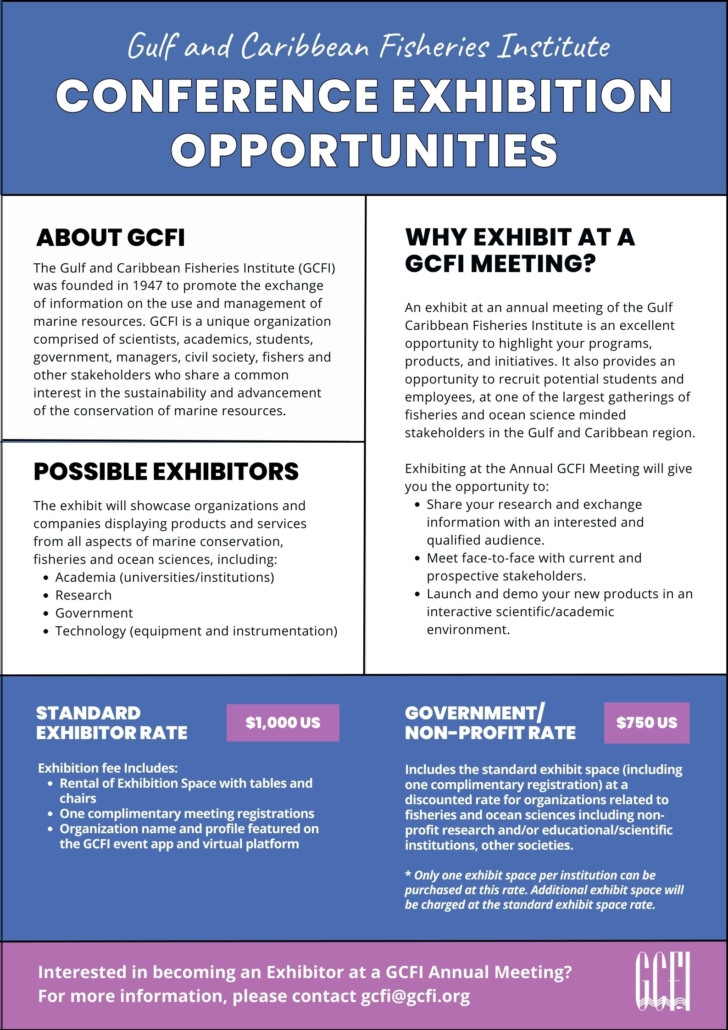
CINEFISH
¿Está interesado en presentar un cortometraje para el Festival de Cine CINEFISH de este año en GCFI77? Si es así, por favor complete este formulario con la siguiente información.
- Título de la película
- Una breve descripción de la película (2-3 oraciones)
- Cineastas (s) (autores)
- Duración de la película – Nota: las películas deben durar un máximo de 15 minutos
- Imagen para película (png o jpg) – Para ser utilizada para promoción
- Enlace para obtener una vista previa de la película (YouTube, Vimeo, GoogleDrive)
- Tipo de película (Documental, Animación o Nuevos Medios)
For more information please contact: [email protected].
